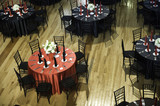Party Rental Policies You Should Know About

Your rental company website should have a comprehensive and detailed FAQ section that explains their policies and how the company handles orders. This allows your customers to make an informed decision about the rentals and ensures that your business doesn’t have to bear any liabilities. Here are some of the common rental policy points that you should be aware of:
1. All the Costs Involved
Your rental company should explain all of the costs involved clearly before they rent out the items. This doesn’t just include the rent charges of the items, but also the delivery and pick-up fees. Some companies typically don’t mention the delivery and pick-up fees clearly and forget to mention the rates of any additional services they might offer. This doesn’t give customers a clear idea of the total cost and that can hurt their budget and planning in the end.
2. Delivery Times and System
Parties can be a busy time and customers often lose track of all the arrangements they need to make. It’s a good idea to keep them informed about the delivery times and schedules so they know when to expect the items delivered to their location. This will allow them to plan in advance and let the rental company know if they need to adjust the delivery schedule.
3. Pickup Schedule and Requirements
Many customers forget to arrange their rented items in a pick-up ready condition and this can cause delays. Always explain how the items should be packed and stored when it’s time for pickup. This will allow them to load and transport the items away from the event venue quickly and without any damage. Your rental company should provide the following instructions:
- Make sure all the cutlery and dinnerware are cleaned and free of food particles.
- Pack up all the cutlery and china in their original crates.
- All tables and chairs should be stacked and placed close to the entryway.
- All linens should be packed away in mesh bags provided during shipping.
You should mention that your rental company will not clean and pack the items for pickup and will consider that task the renter’s responsibility.
4. Payment Policy
Another thing to pay attention to is your deposit requirements. Most companies require a deposit of 50% of the rental amount upfront, to confirm the order; until customers make that deposit, they don’t guarantee the order. You should make this fact very clear to the client to ensure that customers confirm their order and don’t have to scramble in the last minute to find alternative arrangements.
If the order isn’t confirmed in time, you should not hold the items required and reserve any specialized equipment. Your rental company should also explain when they expect the final payment. In most cases, your company should ask for the final payment when the customers receive delivery of the items or when they pick them up for the event.
5. Cancellations
Orders can be cancelled and customers can get a full or partial refund. This depends on the type of company but you should only offer partial returns for a specific period of time. For example, your company might allow a customer to cancel the order up to 5 days before it’s supposed to be delivered. The customer might get 25% to 30% of their deposit as a refund and won’t have to pay the remaining money. If they cancel the order with less than five days to delivery, they might not get a refund at all.
This is because your company will lose business because they reserved the items for the customer’s use and can’t rent them out to others. Last minute orders are unlikely, so these items will just sit in their warehouse instead of being utilized on that particular event date.
6. Damage Waivers
You also need to provide damage waivers for accidental damage and wear. You should charge around 8% to 10% for the waiver and it will cover all items that are damaged because of normal use, this includes glassware, china, linen, etc. In most cases, this waiver is optional and the amount if non-refundable.
The damaged items should be returned to your company so they can assess the amount of damage and determine whether they should provide a waiver in that particular case. Damage caused due to negligence or loss isn’t usually covered by the waiver. Any excessive damage or breaks are a sign of negligence and carelessness and won’t be covered by the waiver.
It’s important that your rental company clearly mentions if they offer waivers and what’s covered under it. If the items are too damaged and the waiver isn’t applied, the customer will have to pay for the replacement items. All missing items can be returned to your company within a specified period of time to get reimbursement.
7. Changes in the Order
Make sure you allow customers to make changes to their order until before the order is shipped to their location. For example, if the customer needs 20 sets of china dinnerware and additional linen and they only find out about the requirement 3 days before the event, they can inform your rental company promptly. If the items are available, your rental company can transport them along with the original order. Some companies may even charge an extra delivery fee for the addition.
8. The Pricing System
Any rental company must explain the pricing system to their clients to ensure there are no misunderstandings. Most businesses will quote prices for a single day event but you can also charge differently for multiple-day events because they make more profit and endure lower costs on these types of projects.
Consider informing your clients how you handle long-term rentals. As long as the items are away from the company warehouse and can’t be used for other events, they’re considered to be rented. Consider charging the client extra fees if a client fails to return any items on time.
9. Delivery and Pickup Process
All of the rented items will arrive at the customer location neatly packed, clean, and ready to be used. Rental company delivery workers should place the items at a convenient location so that you don’t have to lug them from one corner of the venue to another.
You can also expect your clients to keep all items ready for pickup. Standard pickup will only cover transporting the items from the entryway to the vehicle. They may not cover moving the items over several floors or over large distances to the venue. If the pickup workers have to transport the items over several floors, you might consider charging for labor.
10. Equipment Set-Up
Some equipment like tents, staging, and AV equipment require some set-up. Typically, rental companies will usually charge extra labor for the process and that will be mentioned during the order process. You should mention to your clients how the set-up costs are calculated so that you and your clients can plan a budget accordingly. Consider also providing disassembling and pack-up services for such equipment, which can also incur a cost.
Any of these arrangements should be made prior to the delivery and during the ordering process. Typically, it’s difficult to make last minute arrangements for labor and transport if the client waits too long to explain their requirements.
11. Payment Options
You also need to clearly state the payment options to your customers. Some companies do not accept checks and cash and will only allow card transactions. Others don’t accept checks for the final payment but will accept them for deposits. You could even ask your clients to provide identification information if your customers intend to pay for services by cash.
12. Customer Care Contact Information
You should always provide your clients with clear instructions on how to use the customer care numbers and know when to contact the service staff. It would be a good idea to offer support for 7 days a week instead of only offering assistance during office hours and be closed on Sundays.
Along with a great FAQ section, your rental company should also encourage questions and communications from their customers. This ensures that everyone is on the same page.
Need help starting a party rental business? Click here for more information.
Recent Posts
-
Floor Plans For Corporate Events, Part 2
Corporate events can range from anything from a simple lecture to a full-blown convention. Each
-
Floor Plans For Weddings, Part 1
Weddings are a time for celebration and the joining of two families. They take time and understa
-
Insurance For Your Rental Company
Accidents happen. Some can be predicted, but not all can be helped. Liability insurance helps fi




